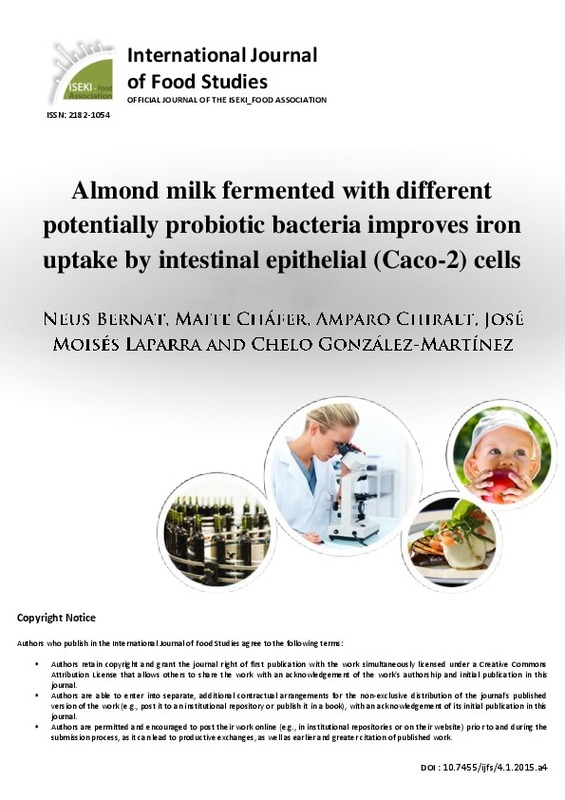JavaScript is disabled for your browser. Some features of this site may not work without it.
Buscar en RiuNet
Listar
Mi cuenta
Estadísticas
Ayuda RiuNet
Admin. UPV
Almond milk fermented with different potentially probiotic bacteria improves iron uptake by intestinal epithelial (Caco-2) cells
Mostrar el registro sencillo del ítem
Ficheros en el ítem
| dc.contributor.author | Bernat Pérez, Neus
|
es_ES |
| dc.contributor.author | Cháfer Nácher, María Teresa
|
es_ES |
| dc.contributor.author | Chiralt, A.
|
es_ES |
| dc.contributor.author | Laparra Llopis, José Moisés
|
es_ES |
| dc.contributor.author | González Martínez, María Consuelo
|
|
| dc.date.accessioned | 2016-04-26T12:51:22Z | |
| dc.date.available | 2016-04-26T12:51:22Z | |
| dc.date.issued | 2015 | |
| dc.identifier.issn | 2182-1054 | |
| dc.identifier.uri | http://hdl.handle.net/10251/62969 | |
| dc.description | Authors retain copyright and grant the journal right of first publication with the work simultaneously licensed under a Creative Commons Attribution License that allows others to share the work with an acknowledgement of the work's authorship and initial publication in this journal | es_ES |
| dc.description.abstract | [EN] New fermented almond milks were developed by using different potentially probiotic bacteria in order to cover the current demand for health-versatile non-dairy products. An in vitro digestion/Caco-2 cell model was used to evaluate the effect of both non-fermented and fermented almond milks on the mitochondrial enzymatic activities of enterocytes. Moreover, macrophages were challenged with the in-vitro digested samples and the production of pro-inflammatory biomarkers TNF- Ñ and IL-6 was quantified. Enzymatic activities of cell cultures seemed to be stimulated by the exposure to both fermented and non-fermented almond milks. Both biomarkers decreased (p< 0.05) in fermented almond milks with either B. bifidum or B. longum. Results showed that fermented almond products favored the energetic metabolism of enterocytes and had a lower inflammatory response than initial almond milk, suggesting it is beneficial for the management of allergies/intolerances. Moreover, the fermentation process enhanced the uptake of iron by Caco-2 cells, especially when using L. rhamnosus and either B. bifidum or B. longum as starters, thus improving the product bioactivity. Therefore, new non-dairy fermented products with functional properties were developed, which might be highly potential alternatives to cow-milk products for sensitized groups of population (allergic and/or intolerant to cow milk or anemic population, among others). | es_ES |
| dc.description.sponsorship | This research has been carried out thanks to a funded project by the Universitat Politècnica de València (PAID-05-11-2740). This work was also supported by the Conselleria de Educación of Valencia government, which granted the author N. Bernat (ACIF/2011). | |
| dc.language | Inglés | es_ES |
| dc.publisher | ISEKI Food Association (IFA) | es_ES |
| dc.relation.ispartof | International Journal of Food Studies | es_ES |
| dc.rights | Reconocimiento (by) | es_ES |
| dc.subject | Almond milk | es_ES |
| dc.subject | Fermentation | es_ES |
| dc.subject | Probiotics | es_ES |
| dc.subject | Iron availability | es_ES |
| dc.subject | Inflammation | es_ES |
| dc.subject.classification | TECNOLOGIA DE ALIMENTOS | es_ES |
| dc.title | Almond milk fermented with different potentially probiotic bacteria improves iron uptake by intestinal epithelial (Caco-2) cells | es_ES |
| dc.type | Artículo | es_ES |
| dc.identifier.doi | 10.7455/ijfs/4.1.2015.a4 | |
| dc.relation.projectID | info:eu-repo/grantAgreement/UPV//PAID-05-11-2740/ | es_ES |
| dc.relation.projectID | info:eu-repo/grantAgreement/GVA//ACIF%2F2011%2F029/ | es_ES |
| dc.rights.accessRights | Abierto | es_ES |
| dc.contributor.affiliation | Universitat Politècnica de València. Departamento de Tecnología de Alimentos - Departament de Tecnologia d'Aliments | es_ES |
| dc.description.bibliographicCitation | Bernat Pérez, N.; Cháfer Nácher, MT.; Chiralt, A.; Laparra Llopis, JM.; González Martínez, MC. (2015). Almond milk fermented with different potentially probiotic bacteria improves iron uptake by intestinal epithelial (Caco-2) cells. International Journal of Food Studies. 4:49-60. https://doi.org/10.7455/ijfs/4.1.2015.a4 | es_ES |
| dc.description.accrualMethod | S | es_ES |
| dc.relation.publisherversion | http://dx.doi.org/10.7455/ijfs/4.1.2015.a4 | es_ES |
| dc.description.upvformatpinicio | 49 | es_ES |
| dc.description.upvformatpfin | 60 | es_ES |
| dc.type.version | info:eu-repo/semantics/publishedVersion | es_ES |
| dc.description.volume | 4 | es_ES |
| dc.relation.senia | 307524 | es_ES |
| dc.contributor.funder | Generalitat Valenciana | |
| dc.contributor.funder | Universitat Politècnica de València |








